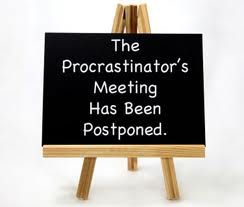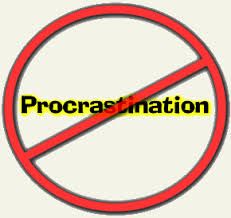Procrastination
End Procrastination for Good: How to Revise Your Life Script
To put an end to putting things off, ask yourself these 8 key questions.
Posted July 9, 2014

If you weren’t conflicted about doing something, you’d do it, right? The problem is that much of the time, as regards tackling a task or pursuing a project, you’re of two separate minds. One part of you knows it should be done and is ready to do it. The other part, and for any number of reasons—eight of which I’ll enumerate below—doggedly resists your best efforts.
Many times you’re not even conscious of this inner conflict. And even when you’re totally aware of the dissonant dynamic underlying your ambivalence, you may still struggle—at times mightily— to resolve these warring thoughts and feelings. For it’s your incongruous assumptions and beliefs that hinder you from taking decisive action.
In this post, what I’ll be zeroing in on is (a) the questions you need to ask yourself when you’re feeling stuck, so that you can determine just why you’re stuck, and (b) how you can learn to respond differently to these questions so that, once and for all, you can get unstuck. For each of the items below, I’ll be suggesting—in italics (the more emphasis here, the better!)—alternative ways of thinking. And once you’re comfortably able to espouse these new “scripts,” your frustrating, self-defeating habit of procrastination will finally come to an end.
I do suggest, however, that you generate your own individually tailored scripts, so you can repeat them to yourself with maximum conviction. And remember, change requires commitment. You’re much more likely to discipline yourself into timeliness when you truly believe the truth, or felt validity, of your positively altered thoughts. So your own words should scrupulously mirror both your core personality and your fundamental values. That way accomplishing the “new you” will not only give you much reason to be proud of yourself but also genuinely authenticate what you’ve always aspired to be (and, in fact, may always have had the potential to be).
So, consider each of the questions below on a 4-point scale as follows:
1 = not at all descriptive 

1 = not at all descriptive
2 = slightly descriptive
3 = moderately descriptive
4 = highly descriptive
Directly after each question, put inside the bracket provided the number that best represents how accurately it describes your behavior:
1. YOU'RE A PERFECTIONIST. Do you procrastinate because you’re a perfectionist and, because you’re so self-critical, are plagued with thoughts that if you embark on something you might not be able to do it well enough? Do you somehow link your acceptability—or “lovability”—to performing things superlatively (a message you possibly received from your parents)? [ ]
In response to this question, and the others below, here’s an example of a new script designed to counter—or “re-write”—this self-defeating program:
"In every instance, I ask myself what—realistically—is good enough? [See my post specifically on this topic.] It’s fine, selectively, to strive for excellence but, in this particular situation, is my perfectionism really a little silly, gratuitous, or a waste of time? . . . I hereby resolve to moderate my standards and make them less stringent, so they’re more in line with reality. And if I logically decide that the task or project actually is beyond my present capability to execute well enough, I’ll seek to develop the skill set necessary to succeed at it, ask someone to help me with it, or just decline to do it altogether. But no longer will I allow myself to sit on the fence indefinitely and have the incompleted (or unbegun) task gnaw away at me."
2. YOU CAN'T ENDURE FRUSTRATION. Do you put off things, stall out or give up on them, because they begin to frustrate you—either because they become unpleasant, boring, or tedious; or because you experience them as more difficult than you’d anticipated? [ ]
"If I decide to do something—whether it’s because I’ve already agreed to it, see it as in some way beneficial to me, or recognize that it’s essential to do if I’m to achieve my short- or long-term goals, I not only undertake it but follow through on it. And I know that—no excuses!—I’m capable of dealing with the frustrations that may go along with its execution. Additionally, if the venture is more difficult than I’d imagined, as long as I can honestly determine that it’s not too difficult, I view this not as a problem but as an opportunity to learn something new. Moreover, I can ask for assistance if some part of it stymies me. And again, if it really is too difficult for me, and no outside help is available, I simply cross it off my list as something that no longer makes any sense to pursue."
3. YOU LACK THE NECESSARY COMMITMENT. Do you procrastinate about doing certain things because, frankly, you’re not that committed to them? [ ]
"Unless I’ve decided that something is important—or crucial—for me to do, I re-evaluate whether I need to initiate it at all. If I conclude that, yes, it is something I should undertake, I thoroughly commit myself to it. If not, I remove it from my list of priorities and (at least for now) simply forget about it."

4. YOU'RE NOT IN THE MOOD. Do you hold off doing something simply because you’re just not in the mood to do it—or just don’t feel like it? [ ]
"Whenever I conclude that a task or project needs to be done—whether because it relates to my accomplishing something I believe is vital to me, or my future—or for purely pragmatic reasons—I do it in a timely fashion. Unless I’m literally immobilized by anxiety or depression (and haven’t yet developed the resources to effectively overcome them), I refuse to let my moods control my behavior. . . . It’s like getting myself to eat vegetables every day, whether or not I feel like consuming them. As an adult, I do what I determine needs to be done, and I don’t allow my behavior to be dictated by my feelings or state of mind. Besides, once I get started on what I know I should do, there’s a fair chance it will get easier, or less distasteful, for me."
5. YOU'RE AFRAID YOU'LL FAIL. Does the fear of failing at something prevent you from beginning, or completing, it? Are you afraid that any failure will make you look foolish or stupid to others? or maybe confirm some of your deepest, most worrisome, self-doubts? [ ]
"I now look at failure (should it occur) as just part of a learning process that will assist me in getting good (or good enough) at something. My family may have been hard on me when I attempted something and didn’t succeed at it, but now I’m my own parent. And I give myself “compassionate permission” to attempt something, whether or not I feel certain I’ll be able to accomplish it. It’s imperative that I not back away from anything that could help me get what I want out of life. Anything that comes up that’s challenging or problematic offers me the opportunity to finally “make peace with” the possibility of failure, so that it no longer has to discourage me from pursuing something that could be valuable for me." [Note, in this respect, my three-part post for PT, “Mastering Failure and Rejection.”]
6. YOU'RE AFRAID YOU'LL SUCCEED. However ironic, do you procrastinate in tackling something because you have a fear of succeeding at it? Unconsciously, might you be afraid that if you were successful at something, you’d only set yourself up for failure later on? Or that you’d anxiously be waiting for the other shoe to fall? Or that there would then be excessive demands or pressures placed on you? Or, that you’d no longer know who you were—if, that is, your very identity is inextricably tied to your seeing yourself as not good enough? For in that case, succeeding might leave you in a very scary existential void. [ ].
"I can start to tell myself that whatever fears I have about success are mostly overblown and distorted, and that they represent dysfunctional beliefs I may have been carrying since I was a child. [Maybe, for example, whenever you beat your father at basketball or a game of chess, he got so furious with you that for weeks on end he subjected you to the silent treatment. And, believe me, as a therapist I’ve been presented with many examples of how a person’s caretakers, however covertly, sharply discouraged their children from getting any better than they thought they were.] If I can’t reformulate these self-sabotaging beliefs on my own (or through delving into the most relevant self-help literature), I’ll get some counseling. It’s time I permitted myself to live up to my potential, rather than regularly tripping myself up to stay within my (artificially limiting) comfort zone. No longer will I let myself snatch failure from the jaws of victory."
7. YOU LACK THE WILL OR DESIRE. Do you put things off because you really didn’t want to do them in the first place, but agreed to because you find it hard to say no to others—even those whose requests are unreasonable, or the person requesting them is someone you dislike? [ ]
"I need to consider whether it’s necessary to go along with another’s request simply because I possess the negatively distorted notion that they’ll disapprove of or even reject me if I don’t (which may be just another outdated “program” from my childhood). I now regularly remind myself that my wants and needs are as important as anybody else’s. And if someone chooses to ignore or dismiss my preferences, I’ll reevaluate whether I ought to keep them in my life.
"So, if I believe that someone is trying to exploit me, or ask me to do something they might just as well do themselves, I’m completely within my rights to turn them down. And, unless it’s someone who has power over me (like my boss!), it’s safe for me to refuse them. Additionally, if they catch me by surprise, and I fall into my old habit of automatically complying with their requests, as soon as I realize I’ve “relapsed,” I’ll think about whether what they’re asking for is something I really want to agree to. If not, I’ll contact them and inform them that I’m sorry but I’ve given their request some more thought and now realize it’s just not “practical” for me to go along with it."
8. YOU LACK IMPULSE CONTROL. Do your immediate desires and impulses frequently interfere with, sabotage, or otherwise undermine your getting to—or completing—things within a reasonable time frame? [ ]
"I’m committed to setting priorities for myself and adhering to these priorities, despite the various temptations that in the past have pulled me away from them. Not that I don’t intend to reward myself later for postponing the gratifications and pleasures that, till now, I haven’t been able to delay. But it’s time for me to grow up—to have my adult self take “executive control” of my impulsive, fun-loving child self. If I’m to genuinely improve my lot in life and view myself as both an effective and successful individual, I just have to keep my word to myself. After all, my basic integrity is on the line here.
"So I now handle what’s on my “to do” list before I permit myself to kick back and do something merely because I enjoy it. Leisure activities can actually be included on my list—’cause I don’t want, or need, to deprive myself of life’s many pleasures. But I can’t give priority to such entertainments and diversions, ’cause I now realize what in the long run will be much better for me and make me happier. Longer-term satisfactions now take precedence for me over shorter-term gratifications and indulgences."

So, in your own words (unless they precisely echo my own!), begin writing out a new script for you to live by. That is, carefully formulate a rebuttal to the questions above that portray your procrastinating behavior. Doing so will be pivotal in helping you change the thought patterns underlying your maladaptive proclivities. And, as a cautionary note, never forget that these old, self-defeating cognitive habits—like any other habit—may not be that easy to break. After all, such irrational thinking may by now have become for you almost a knee-jerk reflex. So unless you painstakingly bring into full awareness what you’ve for so many years been rationalizing to yourself, it will really be tough to install new “programs of belief” that can productively alter your behavior.
At this point, I’d advise you to focus on the items you marked either “3” or “4” (you can always work on any “2’s” later on), and then modify, or reverse, the negative self-talk intimately connected to them. Once you’ve completed your revised “biographical script,” commit yourself to reading it, either to yourself or out loud, at least once a day and for at least 30 days—though, undoubtedly, 60 to 90 days —or indefinitely!—would be even better.
Always keep in mind that it’s your implicit beliefs about yourself in the world that have created your present-day reality. And if faulty and left uncorrected, they’ll continue to create this reality. But in positively revising these ideas about yourself, and becoming ever more adept at embracing them, you’ll be preparing yourself for a life far more in alignment with your aspirations and ideals. And this more up-to-date self-regard will offer you a satisfaction and contentment beyond what you’d ever imagined possible.
So—don’t procrastinate. Do your homework ASAP! ... And say hello to the 2.0 version of yourself now in progress.
Note: If you found this post informative and think others might as well, please consider sending them its link. Additionally, if you’d like to check out other posts I’ve done for Psychology Today (many of which fit within the self-help designation), check here.
© 2014 Leon F. Seltzer, Ph.D. All Rights Reserved.
--- I invite readers to join me on Facebook, and to follow my somewhat unorthodox psychological and philosophical musings on Twitter.




